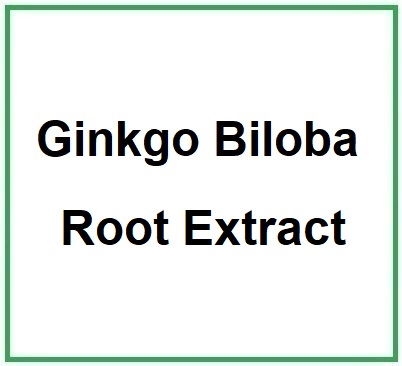Ginkgo Biloba is the botanical name of an ancient tree species known for its fan-shaped leaves and whose seeds and leaves have been used for decades by tradition as herbal remedies.
Ginkgo refers to the only surviving genus in the family Ginkgoaceae. Ginkgo is known to be one of the oldest trees in existence, with a history dating back millions of years.
Biloba refers to the characteristic bilobed shape of the tree's leaves. Ginkgo Biloba leaves are easily recognizable for their distinctive shape, resembling two lobes joined at the base.

Ginkgo Biloba Root Extract Industrial Production
- Extraction of bioactive compounds from the roots of Ginkgo Biloba. This can be done using solvents such as water, ethyl alcohol, or a combination of both, depending on the solubility of the desired compounds.
- Purification. After extraction, the solution containing the bioactive compounds is purified to concentrate the active ingredients and remove impurities and solvent residues.
- Quality Control. The Ginkgo Biloba root extract undergoes quality testing to ensure it meets the required standards in terms of purity and concentration of bioactive compounds.
Form and Color
Products derived from the processing of Ginkgo Biloba are generally liquids or powders. The color can vary from light brown to dark brown, depending on the concentration and method of extraction.

What it is for and where
Ginkgo Biloba is a plant discussed used in dietary supplements and brain health products for asserted nootropic properties i.e., improving blood circulation, particularly to the brain, and for its potential antioxidant properties. It is also used to improve memory and concentration and to treat age-related cognitive disorders. However, recently some studies have found evidence of the carcinogenic activity of this extract in mice, and this extract has been classified as a possible human carcinogen (Group 2B) by the International Agency for Research on Cancer (1).
Cosmetics
Skin conditioning agent. It is the mainstay of topical skin treatment as it has the function of restoring, increasing or improving skin tolerance to external factors, including melanocyte tolerance. The most important function of the conditioning agent is to prevent skin dehydration, but the subject is rather complex and involves emollients and humectants that can be added in the formulation.
CAS 90045-36-6
EC Number 289-896-4
Safety
It appears that Ginkgo Biloba, in a long-term French study, did not reduce the risk of progression to Alzheimer's disease compared with placebo (2), and neither did this herb show differences compared with placebo for memory, attention, visual-spatial skills, language, and executive functions in a study also conducted in the U.S. in 3,069 participants (3). In addition, other studies have shown the toxicity of Ginkgo Biloba leaves or seeds, which may moreover interact with aspirin, warfarin, trazodone, omeprazole, antihypertensive agents, and antihyperglycemic agents (4).
References_____________________________________________________________________
(1) Grosse Y, Loomis D, Lauby-Secretan B, El Ghissassi F, Bouvard V, Benbrahim-Tallaa L, Guha N, Baan R, Mattock H, Straif K; International Agency for Research on Cancer Monograph Working Group. Carcinogenicity of some drugs and herbal products. Lancet Oncol. 2013 Aug;14(9):807-8. doi: 10.1016/s1470-2045(13)70329-2. PMID: 24058961.
(2) Vellas B, Coley N, Ousset PJ, Berrut G, Dartigues JF, Dubois B, Grandjean H, Pasquier F, Piette F, Robert P, Touchon J, Garnier P, Mathiex-Fortunet H, Andrieu S; GuidAge Study Group. Long-term use of standardised Ginkgo biloba extract for the prevention of Alzheimer's disease (GuidAge): a randomised placebo-controlled trial. Lancet Neurol. 2012 Oct;11(10):851-9. doi: 10.1016/S1474-4422(12)70206-5.
(3) DeKosky ST, Williamson JD, Fitzpatrick AL, Kronmal RA, Ives DG, Saxton JA, Lopez OL, Burke G, Carlson MC, Fried LP, Kuller LH, Robbins JA, Tracy RP, Woolard NF, Dunn L, Snitz BE, Nahin RL, Furberg CD; Ginkgo Evaluation of Memory (GEM) Study Investigators. Ginkgo biloba for prevention of dementia: a randomized controlled trial. JAMA. 2008 Nov 19;300(19):2253-62. doi: 10.1001/jama.2008.683.
Abstract. Context: Ginkgo biloba is widely used for its potential effects on memory and cognition. To date, adequately powered clinical trials testing the effect of G. biloba on dementia incidence are lacking. Objective: To determine effectiveness of G. biloba vs placebo in reducing the incidence of all-cause dementia and Alzheimer disease (AD) in elderly individuals with normal cognition and those with mild cognitive impairment (MCI).... Conclusions: In this study, G. biloba at 120 mg twice a day was not effective in reducing either the overall incidence rate of dementia or AD incidence in elderly individuals with normal cognition or those with MCI. Trial Registration clinicaltrials.gov Identifier: NCT00010803.
(4) Mei N, Guo X, Ren Z, Kobayashi D, Wada K, Guo L. Review of Ginkgo biloba-induced toxicity, from experimental studies to human case reports. J Environ Sci Health C Environ Carcinog Ecotoxicol Rev. 2017 Jan 2;35(1):1-28. doi: 10.1080/10590501.2016.1278298. PMID: 28055331; PMCID: PMC6373469.
Abstract. Ginkgo biloba seeds and leaves have been used as a traditional herbal remedy for thousands of years, and its leaf extract has been consumed as a botanical dietary supplement for decades. Ginkgo biloba extract is a complex mixture with numerous components, including flavonol glycosides and terpene lactones, and is one of the most widely sold botanical dietary supplements worldwide. Concerns about potential health risks for the general population have been raised because of the widespread human exposure to Ginkgo biloba and its potential toxic and carcinogenic activities in rodents. The National Toxicology Program conducted 2-year gavage studies on one Ginkgo biloba leaf extract and concluded that there was clear evidence of carcinogenic activity of this extract in mice based on an increased incidence of hepatocellular carcinoma and hepatoblastoma. Recently, Ginkgo biloba leaf extract has been classified as a possible human carcinogen (Group 2B) by the International Agency for Research on Cancer. This review presents updated information on the toxicological effects from experimental studies both in vitro and in vivo to human case reports (caused by ginkgo seeds or leaves), and also summarizes the negative results from relatively large clinical trials.
![]() Ginkgo Biloba Root Extract
Ginkgo Biloba Root Extract 


